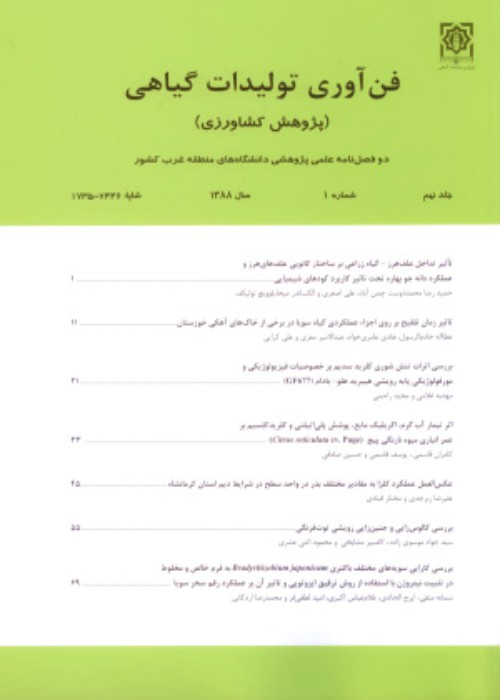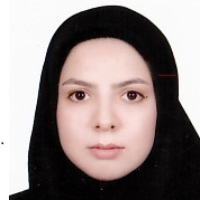In Vitro Effect of Various Extracting Methods with Water, Acetone and Hexane Solvents, on some Phytochemical and Antimicrobial Properties of Ajowan, Mentha, Garden Sage and Beeswax Waste
Author(s):
Article Type:
Research/Original Article (دارای رتبه معتبر)
Abstract:
The aim of this study was to investigate effect of various extracting methods with water, acetone and hexane solvents, on some phytochemical and antimicrobial properties of ajowan, mentha, garden sage and beeswax waste. In the antimicrobial study, for each microorganism a separated experiment was conducted in factorial arrangement based on completely randomized design with three replications. The studied microorganisms were included Bacillus cereus, Proteus vulgaris, Fusarium oxysporum, Alternaria alternata, Pythium aphanidermatum and Verticillium dahlia. Experimental treatments were material types in four levels (beeswax, ajowan seed, mentha and garden sage leaves) and different extracting methods with different solvents in five levels (Maceration method at room temperature with hexane, distilled water and acetone, and soxhlet with hexane and acetone). Maceration with water was included the lowest levels of phenol and flavonoid in all the materials, and was not able to extract any tannin. Maceration with acetone in beeswax waste and soxhlet with acetone in other materials were the effective methods for extracting phenol and flavonoid. Acetone solvent in menthe and garden sage extract had more tannin, while beeswax waste and ajowan responded better to hexane solvent. The microbial result showed that the studied materials and extracting methods had no inhibitory effect on Fusarium oxysporum. The highest inhibitory diameter of growth for other studied microorganisms was assigned to hexane extract of ajowan with soxhlet method. The various extracts of beeswax had inhibitory effect on all the mentioned microorganisms except for Alternaria alternata, confirming the antimicrobial property of the waste. In general, the results of this study illustrated that the studied organic extracts had acceptable potential in controlling these pathogens, and the difference in the type of solvent polarity and the extraction method had a significant effect on the extracted componets and consequently antimicrobial characteristics of the extracts.
Keywords:
Language:
Persian
Published:
نشریه فنآوری تولیدات گیاهی, Volume:21 Issue: 1, 2022
Pages:
147 to 162
https://magiran.com/p2424856
دانلود و مطالعه متن این مقاله با یکی از روشهای زیر امکان پذیر است:
اشتراک شخصی
با عضویت و پرداخت آنلاین حق اشتراک یکساله به مبلغ 1,390,000ريال میتوانید 70 عنوان مطلب دانلود کنید!
اشتراک سازمانی
به کتابخانه دانشگاه یا محل کار خود پیشنهاد کنید تا اشتراک سازمانی این پایگاه را برای دسترسی نامحدود همه کاربران به متن مطالب تهیه نمایند!
توجه!
- حق عضویت دریافتی صرف حمایت از نشریات عضو و نگهداری، تکمیل و توسعه مگیران میشود.
- پرداخت حق اشتراک و دانلود مقالات اجازه بازنشر آن در سایر رسانههای چاپی و دیجیتال را به کاربر نمیدهد.
In order to view content subscription is required
Personal subscription
Subscribe magiran.com for 70 € euros via PayPal and download 70 articles during a year.
Organization subscription
Please contact us to subscribe your university or library for unlimited access!



